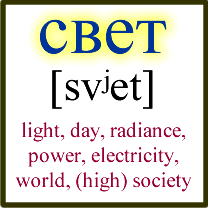
An interesting and useful Russian word I came across today is свет [svʲet], which means light, and also lights, lighting, day, radiance, power, electricity, world and (high) society.
It comes from the Old East Slavic свѣтъ (světŭ – light; world), from Proto-Slavic *světъ (light; world), from the Proto-Balto-Slavic *śwaitas, from the Proto-Indo-European *ḱwoytos / *ḱweytos (bright; shine), from *ḱwey-.
Related words in other Slavic languages include: Belarusian: свет (world), Ukrainian: світ (world, universe), Bulgarian свят (world, earth, universe), Macedonian: свет (world), Slovene: svẹ̑t (sacred, holy), Czech: svět (world), Polish: świat (world), and Slovak: svet (world) and svetlo (light).
Words for white in Germanic languages come from the same PIE root: such as white in English, weiß in German, wit in Dutch, hvit in Norwegian, vit in Swedish and hvid in Danish.
Here are some examples of related words and usage:
– светать = to get/grow light
– светлый = bright, light, lucid
– светильник = lamp
– светить = to shine
– светлеть = to lighten
– свети́ло = heavenly body; luminary
– светофо́р = traffic light
– свеча́ = candle; spark plug; suppository
– дневно́й свет = daylight
– со́лнечный свет = sunshine, sunlight
– я́ркий свет = bright light
– ско́рость све́та = speed of light
– при свете луны/свечи = by moonlight/candlelight
– в свете = in the light of
– ни свет ни заря = at the crack of dawn
– чуть свет = at daybreak
– появи́ться на свет = to be born (“to arrive in the light/world”)
– выходить в свет = to be published (“to face the light/world”)
– проливать свет на что = to shed/throw light on sth
– тот свет = the next world
The name Светлана (Svetlana) also comes from the same root.
Sources: Reverso, Wiktionary
Latvian has svēts meaning ‘sacred’ (Svētdiena = Sunday). But this is, as far as I am aware, its primary meaning an there is no particular association with ‘light’ (gaisma is the Latvian word for ‘light’). I suspect that it might be a Slavic borrowing through the Orthodox Church. The territories that make up modern-day Latvia were relatively late, in European terms, to take up Christianity.
Welsh gwyn (= ‘white’) has a secondary meaning of ‘holy’ or ‘pure’. This explains its frequent appearance (usually as -wyn or -wen) in Welsh personal names. Also, Gwynfa = Paradise (gwyn ‘holy’ + ma[n] ‘place’).
The Russian Святослав (Svyatoslav), and its variants in the other Slavic languages, will be another name from the same root.